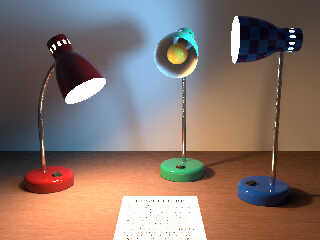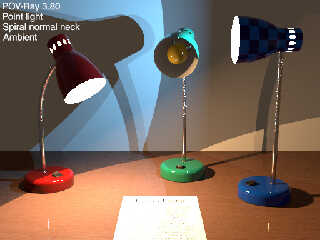 |
 |
|
 |
|
 |
|  |
|  |
|
 |
|
 |
|  |
|  |
|
 |
I'm still in the process of calibrating indirect lighting when radiosity
is not used, or when radiosity { max_sample } is used, but aside from
that, the module is essentially complete. In this illustration, the red
lamp on the left has been directed to aim at the paper, and the other
two lamps were directed to aim at a specified angle.
The lamps' brightness can be synchronized with Lightsys IV.
Post a reply to this message
Attachments:
Download 'desklamp.jpg' (93 KB)
Preview of image 'desklamp.jpg'

|
 |
|  |
|  |
|
 |
|
 |
|  |
|  |
|
 |
Cousin Ricky <ric### [at] yahoo com> wrote:
> I'm still in the process of calibrating indirect lighting when radiosity
> is not used, or when radiosity { max_sample } is used, but aside from
> that, the module is essentially complete. In this illustration, the red
> lamp on the left has been directed to aim at the paper, and the other
> two lamps were directed to aim at a specified angle.
>
> The lamps' brightness can be synchronized with Lightsys IV.
This looks so good !
So you are doing a macro that makes sure all values stay physically possible
range without radiosity or is it something else altogether? is it an on_off
basis ? com> wrote:
> I'm still in the process of calibrating indirect lighting when radiosity
> is not used, or when radiosity { max_sample } is used, but aside from
> that, the module is essentially complete. In this illustration, the red
> lamp on the left has been directed to aim at the paper, and the other
> two lamps were directed to aim at a specified angle.
>
> The lamps' brightness can be synchronized with Lightsys IV.
This looks so good !
So you are doing a macro that makes sure all values stay physically possible
range without radiosity or is it something else altogether? is it an on_off
basis ?
Post a reply to this message
|
 |
|  |
|  |
|
 |
|
 |
|  |
|  |
|
 |
On 2022-08-25 07:26 (-4), Mr wrote:
> Cousin Ricky <ric### [at] yahoo com> wrote:
>> I'm still in the process of calibrating indirect lighting when radiosity
>> is not used, or when radiosity { max_sample } is used, [snip]
>
> This looks so good !
> So you are doing a macro that makes sure all values stay physically possible
> range without radiosity or is it something else altogether? is it an on_off
> basis ?
I'm trying to maintain consistent lighting between radiosity scenes and
non-radiosity scenes. In a non-radiosity scene, this means that the
reflection of the inside of the hood must be accounted for somehow.
I've chosen to do this with a second light_source; but this means
figuring out how much the hood would contribute to radiosity.
In addition, the inside of the hood is very bright, and this means nasty
artifacts unless you have an insanely high count[1] or you limit the
radiosity contribution using max_sample. The latter option also needs
that second light_source.
[1] Before you respond, Alain, yes, I know about the importance feature. com> wrote:
>> I'm still in the process of calibrating indirect lighting when radiosity
>> is not used, or when radiosity { max_sample } is used, [snip]
>
> This looks so good !
> So you are doing a macro that makes sure all values stay physically possible
> range without radiosity or is it something else altogether? is it an on_off
> basis ?
I'm trying to maintain consistent lighting between radiosity scenes and
non-radiosity scenes. In a non-radiosity scene, this means that the
reflection of the inside of the hood must be accounted for somehow.
I've chosen to do this with a second light_source; but this means
figuring out how much the hood would contribute to radiosity.
In addition, the inside of the hood is very bright, and this means nasty
artifacts unless you have an insanely high count[1] or you limit the
radiosity contribution using max_sample. The latter option also needs
that second light_source.
[1] Before you respond, Alain, yes, I know about the importance feature.
Post a reply to this message
|
 |
|  |
|  |
|
 |
|
 |
|  |
|  |
|
 |
Cousin Ricky <ric### [at] yahoo com> wrote:
> In addition, the inside of the hood is very bright, and this means nasty
> artifacts unless you have an insanely high count[1] or you limit the
> radiosity contribution using max_sample. The latter option also needs
> that second light_source.
I'm guessing the extreme brightness is what's causing the lack of anti-aliasing
around the front edge of the hood. Could the use of light_group be used to fix
that? com> wrote:
> In addition, the inside of the hood is very bright, and this means nasty
> artifacts unless you have an insanely high count[1] or you limit the
> radiosity contribution using max_sample. The latter option also needs
> that second light_source.
I'm guessing the extreme brightness is what's causing the lack of anti-aliasing
around the front edge of the hood. Could the use of light_group be used to fix
that?
Post a reply to this message
|
 |
|  |
|  |
|
 |
|
 |
|  |
|  |
|
 |
On 2022-08-26 17:16 (-4), Dave Blandston wrote:
>
> I'm guessing the extreme brightness is what's causing the lack of anti-aliasing
> around the front edge of the hood. Could the use of light_group be used to fix
> that?
I actually did use a light group in my original lamp 17 years ago, but
aliasing was not the issue. I used large fade distances, which did not
illuminate the hood interior sufficiently to cause anti-aliasing
difficulties.
The problem I had back then was how to avoid a sharp cutoff of the
light, which is recessed, by the hood without requiring an area light.
The attached image shows this issue. I solved it in 2005 by using a
non-recessed wide-angle spotlight to illuminate the scene, and a light
group to illuminate the hood interior.
I made the decision last year to abandon that approach. There would be
a single light_source, centered on the light bulb, for both the hood
interior and the scene, with the spotlight being repurposed for
radiosity replacement. But a light group would not have solved the
problem anyway; the issue is the light intensity that realistic
attenuation entails, and a light group doesn't change that. I verified
this by rendering my original 2005-2006 lamp with input arguments that
forced realistic attenuation.
I would rather deal with hyper-white aliasing by post-processing.
Post a reply to this message
Attachments:
Download 'test_desklamp-v38d0r0.jpg' (51 KB)
Preview of image 'test_desklamp-v38d0r0.jpg'

|
 |
|  |
|  |
|
 |
|
 |
|  |
|  |
|
 |
Cousin Ricky <ric### [at] yahoo com> wrote:
> I would rather deal with hyper-white aliasing by post-processing.
Good call - lots going on there to deal with!
Forgive me for mentioning one other idea since you've already decided how to
handle that, but a quick and easy fix might be to place a partially-transparent
object (maybe a torus) around the rim of the hood and give it the
no_image/no_reflection/no_radiosity attributes (whichever apply) to shade the
rim just enough that it gets anti-aliased. Just an idea.
That's a very pleasant scene to look at, by the way. com> wrote:
> I would rather deal with hyper-white aliasing by post-processing.
Good call - lots going on there to deal with!
Forgive me for mentioning one other idea since you've already decided how to
handle that, but a quick and easy fix might be to place a partially-transparent
object (maybe a torus) around the rim of the hood and give it the
no_image/no_reflection/no_radiosity attributes (whichever apply) to shade the
rim just enough that it gets anti-aliased. Just an idea.
That's a very pleasant scene to look at, by the way.
Post a reply to this message
|
 |
|  |
|  |
|
 |
|
 |
|  |
|  |
|
 |
I'm still doing final testing, but I've posted a beta version:
https://github.com/CousinRicky/POV-DeskLamp
Post a reply to this message
|
 |
|  |
|  |
|
 |
|
 |
|  |




![]()